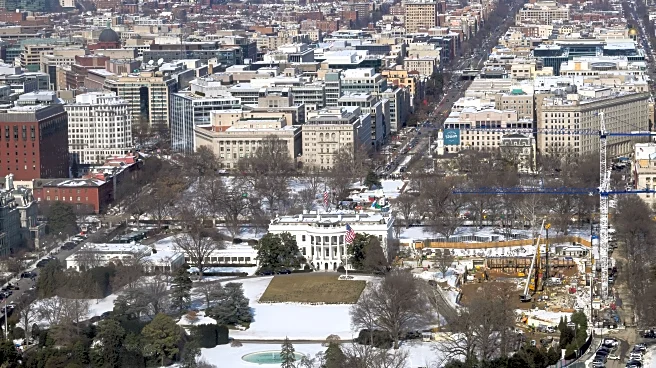What's Happening?
President Trump has announced a new tariff system targeting imports of medium and heavy-duty vehicles (MHDVs), parts, and buses, following a report from the Secretary of Commerce. The report highlighted
that these imports pose a threat to U.S. national security due to their significant penetration in the domestic market. The tariffs include a 25% ad valorem duty on MHDVs and key parts, and a 10% duty on buses. The decision aims to bolster domestic production and reduce dependency on foreign suppliers, which currently account for a substantial portion of the U.S. market. The tariffs are set to take effect on November 1, 2025, and are part of a broader strategy to stabilize the market share of U.S.-produced MHDVs at approximately 80%.
Why It's Important?
The imposition of tariffs on MHDVs and related parts is a significant move to protect U.S. national security by ensuring a robust domestic manufacturing base. These vehicles are crucial for military readiness, emergency response, and maintaining critical infrastructure. By reducing import dependency, the U.S. aims to secure its supply chains and enhance industrial resilience. The tariffs are expected to encourage capital investment and innovation within the domestic industry, potentially creating high-quality jobs and expanding the skilled workforce. However, the increased costs for imported vehicles and parts could impact businesses relying on these imports, leading to potential price increases for consumers.
What's Next?
The Secretary of Commerce will continue to monitor imports and may adjust the scope of tariffs to include additional parts if necessary. The administration plans to establish processes to ensure compliance and prevent circumvention of the tariffs. The impact on domestic production and market dynamics will be closely watched, with potential adjustments to the tariff system based on evolving national security needs. Stakeholders, including manufacturers and importers, will need to navigate the new regulatory landscape and may seek to adapt their supply chains to mitigate the impact of tariffs.
Beyond the Headlines
The decision to impose tariffs reflects broader geopolitical and economic considerations, including the need to maintain U.S. industrial capabilities in the face of global competition. It underscores the strategic importance of the MHDV sector in national defense and infrastructure. The move may also influence international trade relations, particularly with countries heavily involved in exporting these vehicles and parts to the U.S. The long-term effects on the domestic industry could include increased investment in technology and manufacturing processes, potentially reshaping the competitive landscape.










